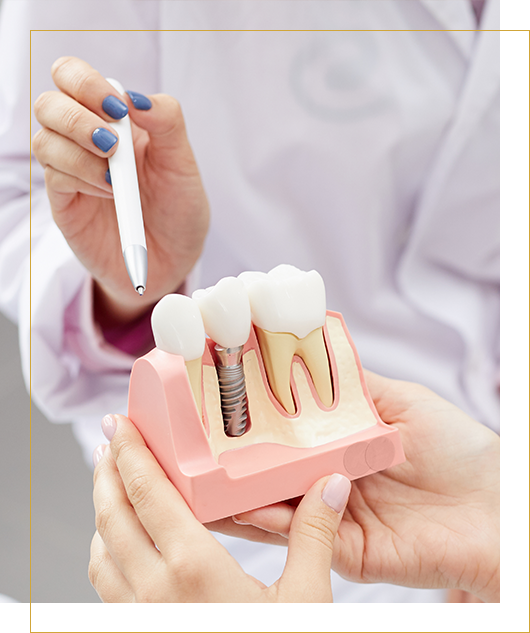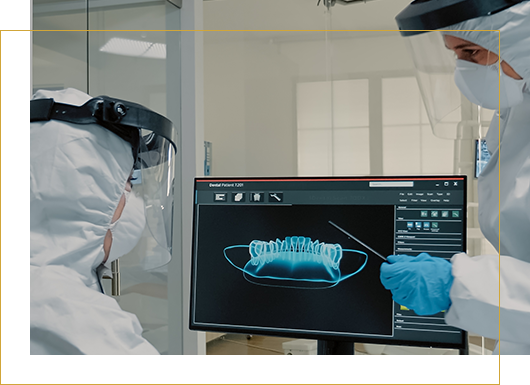Multiple Teeth Implants in Mundaring
We all know how important it is to have a complete, beautiful set of teeth. If you’re looking for a way to make your smile stand out, check with us about our multiple teeth dental implant service.


Regain Your Healthy Smile with Our Multiple Teeth Implants
Dental implants are ideal for replacing missing teeth as they look and feel like natural teeth. Unlike dentures, dental implants are placed in the jawbone and do not rely on the adjacent teeth for support. This minimises the risk of damaging your dental health.
At Mundaring Dental & Implant Centre, we offer multiple dental implants that will give you a beautiful, confident smile that you can be proud of. Our dental practice uses state-of-the-art technology, and our team of skilled professionals will ensure that you receive the best possible care. If you are missing several teeth, dental implants may be the right treatment for you. Contact us today at 08 6495 2000 to schedule a consultation. We would be happy to answer any questions you have.
Reasons Why You Would Need Multiple Teeth Implants

You have chipped and missing teeth: Tired of hiding the gaps in your smile because of missing teeth? Over time, missing or cracked teeth can result in bone loss, affecting the surrounding healthy ones, so don’t wait any longer; preserve your jawbone with our multiple teeth implants today!
Extrusion or movement of opposing or adjacent teeth: Losing teeth is never easy, and neighbouring ones may start to move towards the space left behind. At Mundaring Dental & Implant Centre, we provide natural-looking multiple teeth implants that can improve your quality of life.
Smile insecurity: If you’re missing a few teeth or have sunken features, it can be challenging to feel confident about your smile. Fortunately, there is hope! Multiple teeth dental implants are designed specifically for this purpose and will give you back what was once yours: beautifully glowing teeth.
Speaking problems: Helping you speak confidently, our multiple teeth implants will give you a more natural pronunciation. You never have to worry about missing teeth; enjoy speaking without limits; call us to find out how we can help.

Why choose
Mundaring dental
& implant centre

Convenient Quality Dental Care
With over 50 years of combined experience, our team of professionals continues to provide high-quality dental services, from general dentistry and dental implant services to restorative and cosmetic dentistry.

A Compassionate Team Utilizing Modern Technology:
Mundaring Dental & Implant Centre offers the latest dental implant technology and techniques to provide you with the best possible results. Our state-of-the-art equipment makes your dental implant experience as easy and stress-free as possible.

Easily Accessible
Mundaring Dental & Implant Centre is proud to offer flexible payment plan options to make sure that everyone receives the dental care they need.

Same-day Dentistry and Fast Turn Around Time
Mundaring Dental & Implant Centre offers same-day service for various dental treatments, including dental crowns. You can get high-quality dental care and more natural-looking crowns in just one visit!

Why choose Mundaring dental & implant centre

Convenient Quality Dental Care:
We are a team of experienced professionals providing a range of dental implant services to meet your needs. With our combined experience of over 50 years, you can trust that you'll receive quality service every time.

A Compassionate Team Utilizing Modern Technology:
Mundaring Dental & Implant Centre offers the latest dental implant technology and techniques to provide you with the best possible results. Our state-of-the-art equipment makes your dental implant experience as easy and stress-free as possible.

Easily Accessible:
Mundaring Dental & Implant Centre offers a variety of dental implant options and flexible payment plans. We understand that dental implants can be expensive, so we offer interest-free financing to make the process easier for you.
FAQs
Who can get multiple implants?
For patients with the following characteristics, dental implant process is usually recommended:
- To undergo dental extractions or surgery, they need to be in good oral health.
- The patient should be in good overall health, without significant health problems.
- A sufficient bone density is also essential.
- The gums should not be infected.
A healthy outcome requires consideration of unhealthy habits such as smoking and grinding of the teeth as well as chronic conditions like diabetes and heart disease. Furthermore, taking certain medications regularly may increase your chances of having a failed dental implant treatment.
If you have poor bone density, an implant may not be placed in your jaw. An individual with missing teeth may require bone grafting surgery before a dental implant can be placed. The goal of a bone graft is to thicken and densify the jawbone so that dental implants can be safely positioned.
What happens during multiple implants procedure?
First appointment. Your dentist will examine you to determine if you are an ideal candidate for multiple implants at the initial consultation. This will involve a clinical examination and advanced digital imaging. Your dental professional may also request your medical history.
Bone graft procedure. To ensure the stability and provide a solid foundation, we may suggest a bone graft if your bone is thin or weak. A sinus lift is needed if the sinuses are too close to the jaw due to a loss of bone height in the upper jaw. It might take a few weeks or months for it to heal before the implant can be placed.
Before the implant surgery. Your comfort will be our priority during dental treatment. Anaesthetic will be administered to keep you at ease.
Placement of the implant. It is necessary to make an incision to expose the bone beneath the gum line. A hole will be drilled and a metal post or an implant placed, aligned with the tooth root. After closing the incision and promoting healing, sutures will be used. A full recovery time from surgery takes four to six months.
Osseointegration. As you recover, the entire healing time will allow the jawbone to undergo the process of osseointegration. Your jawbone will grow around the implant once it has been placed. Following that, the implant fuses into the gum tissue. Based on the circumstances, this process may occur from three to nine months.
Placement of the abutment. Abutments are attached to implants once they are secure enough. The device connects the crown to the implant.
Restoration. Once your gums have healed completely, your dentist will make a mould of your teeth and take impressions for the crown. The jawbone must be firm enough to hold a replacement tooth in place, and it must be able to resist biting pressure.
Is it better to have multiple implants or dentures?
Multiple dental implants have grown increasingly popular in recent years as an alternative to dentures as a long-term solution to missing teeth. Their greater durability and cost savings complement their higher cost than dentures. Dental implants require fewer visits to the dentist than dentures since they are easier to maintain.
It is clear that dental implants outweigh conventional dentures in terms of advantages. However, your unique circumstances will determine which option is best for you.
The following are key factors to consider while deciding between dental implants and dentures:
Insurance coverage: Dental insurance policies usually cover dentures. On the other hand, dental implants are often referred to as cosmetic surgeries. Costs associated with this type of invasive procedure are usually not covered by insurance.
Durability: If properly cared for, dental implants can last for many years. This means that long-term costs may be reduced because dentures, in comparison, require replacement more frequently.
Long-term oral health: When chewed on with pressure, implants will contribute to bone preservation and prevent gum tissue shrinkage. By preserving your bone, you also reduce the likelihood of losing more teeth. On the other hand, dental implant procedures do not have the same effect. Occasionally, a poorly fitted one can lead to bone loss.
Oral hygiene: Daily cleaning of dentures is essential. In contrast, implants can be kept clean simply by brushing and flossing them like natural teeth.
Improved appearance: Implants appear and function just like your natural teeth. Dentures, on the other hand, may feel heavy and uncomfortable.
Factors that may contribute to implant failure
You have invested a lot of time and money in the dental implant surgical procedure. In line with this, you would like these investments to pay off with better outcomes, but unfortunately, this is not always possible due to several factors that cause dental implants to fail. Listed below are some of the factors to look out for:
Smoking: To get dental implants, you must stop smoking. Following surgery, self-care has less to do with the implant dentist and more to do with you. If you desire long-lasting dental implants with a low probability of failure, you must be willing to wait at least six months for your implants to heal.
Your eating habits: Take plenty of soup, mashed potatoes, or applesauce if you have dental implants. If you have a dental implant procedure, you will only consume soft foods for the first few weeks. Hard foods can damage implants if they are consumed during the healing process. As the implant heals and connects to the jaw bone, chewy foods and hard foods can strain it to the point of failure.
The utilised implant material: The type of implant material used in the procedure is crucial in determining how long dental implants last. For long-term durability, it is best to use high-quality materials. It is a good idea to discuss the substances used in implants with your dentist.
Peri-implantitis: An infection of the soft tissues and hard tissues (gum disease, bone loss) surrounding dental implants is called peri-implant disease. Poor oral hygiene can lead to food accumulation and facilitate the growth of harmful bacteria. Under the gum line, bacteria may collect on the implant’s surface, just as it does on real teeth.
As bacteria infect the gum tissue over time, they cause inflammation, which weakens the gums and, if not treated early enough, causes the bone structure under the implant to deteriorate.
Improper expertise and planning: Dentistry involves a high level of technique sensitivity, and each step needs to be planned meticulously. It is more likely that a well-planned dental implant procedure will succeed than an unplanned one. Therefore, you need to find an implant dentist with adequate experience to place your dental implants.
Can you get multiple implants if you have bone loss?
To achieve most dental restorations, healthy gums and a strong jawbone are essential. People with weak bone structures can still get multiple implants. Your dental professional will determine the most suitable method for ensuring the effectiveness of the implants.
Bone grafting may be necessary if your jawbone is not strong enough to support a dental implant. Chewing exerts a great deal of pressure on your teeth, and if your bone can’t support the implant, the surgery will fail. Bone grafting is an option that may improve the success of your dental implant procedure.
Why are multiple teeth implants expensive?
For multiple dental implants, titanium is used, and the implants are screwed into the jawbone. The titanium material is light, durable, and outlasts other materials used for dental work. It will fuse with the bone after roughly 3-6 months. A strong and stable implant requires osseointegration, which lasts for many years.
Another component of the implant is the porcelain crown, which will closely resemble the appearance of a normal tooth and completely cover the titanium post. To blend in with the rest of your smile, your crown will be tailored to fit the size and shape of your teeth.
Finally, keep in mind that receiving a dental implant requires surgery. Therefore, multiple implants are considered expensive. To prevent complications, many nerves need to be avoided. Thus, placing the implant effectively requires specific training, research, and expertise. Performing the work correctly and ensuring that it will last a lifetime requires careful planning and perfect execution. When an implant isn’t put in the right place, you may feel pain, have headaches, and lose facial features.
